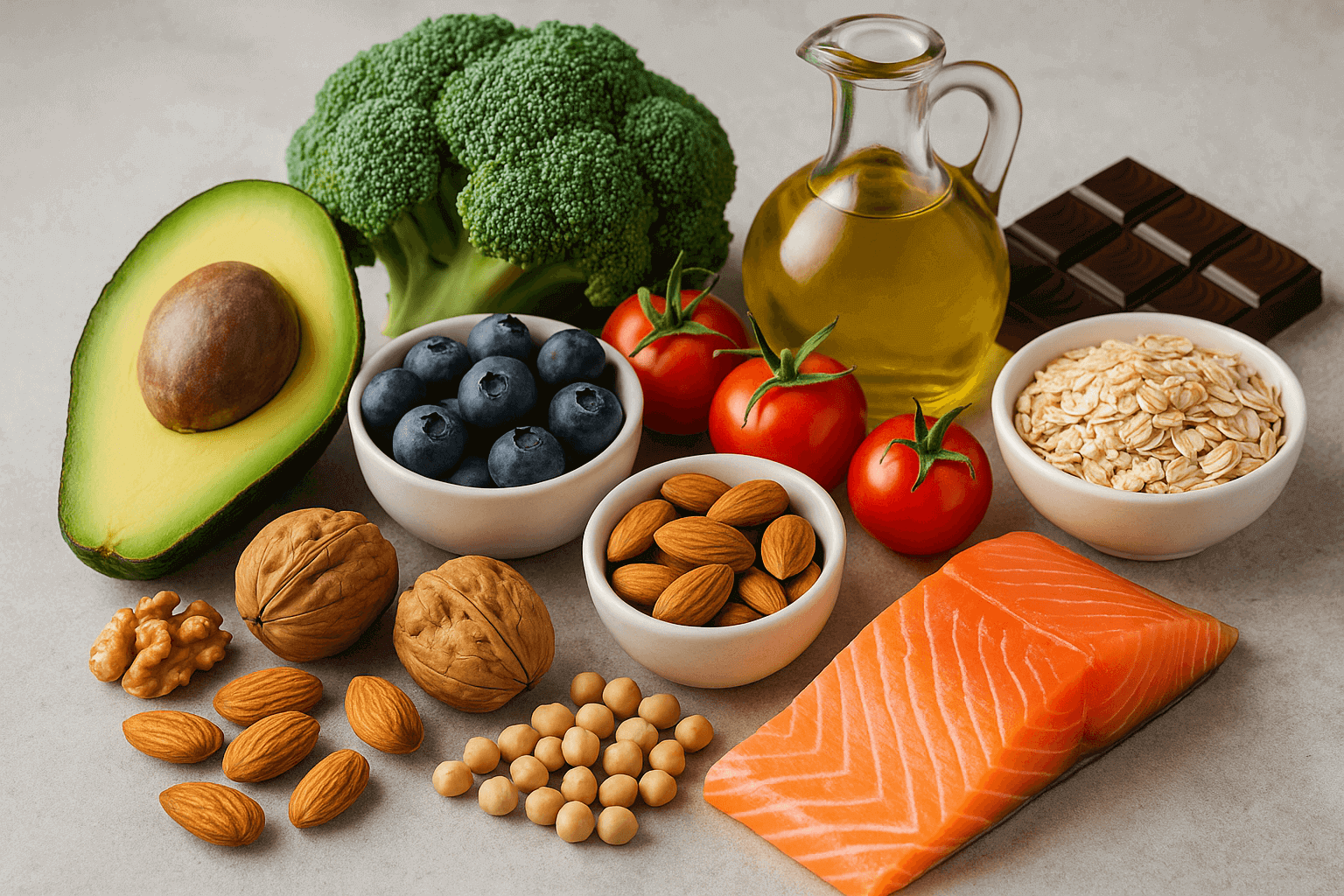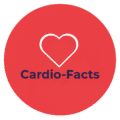
Choosing the best foods for heart health is one of the most effective ways to protect your cardiovascular system. Research consistently shows that what you eat can significantly influence blood pressure, cholesterol levels, inflammation, and long-term cardiovascular risk. In this article, we’ll explore the best foods for heart health, supported by clinical evidence, and offer simple tips to incorporate them into your daily routine.
🥑 1. Avocados
Rich in monounsaturated fats and potassium, avocados help lower LDL (“bad”) cholesterol and support healthy blood pressure. One study published in the Journal of the American Heart Association found that eating one avocado per day improved lipid profiles in overweight adults.
How to enjoy: Spread on whole grain toast, add to salads, or blend into smoothies.
🐟 2. Fatty Fish (Salmon, Mackerel, Sardines)
Fatty fish are excellent sources of omega-3 fatty acids, known to reduce triglycerides, blood pressure, and inflammation. The AHA recommends two servings per week for optimal heart benefits.
How to enjoy: Bake or grill with lemon and herbs; avoid frying to preserve benefits.
🌾 3. Oats and Whole Grains
Oats are high in beta-glucan, a soluble fiber that reduces cholesterol absorption. Whole grains in general help regulate blood sugar and improve vascular function.
How to enjoy: Start your day with oatmeal topped with berries and a sprinkle of chia seeds.
🥦 4. Leafy Greens (Spinach, Kale, Swiss Chard)
Loaded with nitrates, vitamin K, and antioxidants, leafy greens support vascular health and arterial flexibility.
How to enjoy: Add to smoothies, stir-fries, or serve raw in salads.
🫘 5. Legumes (Beans, Lentils, Chickpeas)
Packed with plant-based protein, fiber, and minerals, legumes help reduce LDL cholesterol and improve glycemic control—especially important in metabolic syndrome.
How to enjoy: Substitute for meat in soups, stews, and pasta dishes.
🥜 6. Nuts (Almonds, Walnuts)
Regular nut consumption is linked to a lower risk of coronary heart disease. Walnuts are especially rich in omega-3s, while almonds are high in magnesium and fiber.
How to enjoy: A small handful as a snack or chopped over yogurt or oatmeal.
🫐 7. Berries (Blueberries, Strawberries)
These fruits are rich in anthocyanins, compounds shown to reduce oxidative stress and inflammation, both major drivers of cardiovascular disease.
How to enjoy: Fresh or frozen, blended into smoothies or sprinkled over cereals.
🧄 8. Garlic
Garlic contains allicin, a compound with blood pressure-lowering and cholesterol-reducing effects. Some studies suggest it may also prevent platelet aggregation.
How to enjoy: Add minced garlic to dressings, sauces, or roasted vegetables.
🍫 9. Dark Chocolate (70%+ cacao)
Rich in flavanols, dark chocolate may improve endothelial function and reduce blood pressure—but moderation is key.
How to enjoy: 1–2 squares per day as a treat, not a habit.
🫒 10. Extra Virgin Olive Oil
The cornerstone of the Mediterranean diet, olive oil is high in polyphenols and monounsaturated fats that protect against heart disease.
How to enjoy: Use in salad dressings or as a finishing oil over cooked vegetables.
🍅 11. Tomatoes
Tomatoes are high in lycopene, a powerful antioxidant that may reduce LDL oxidation and improve arterial function.
How to enjoy: Roasted, in sauces, or raw with a dash of olive oil.
☕ 12. Green Tea
Green tea contains catechins, which may improve cholesterol levels, lower blood pressure, and reduce inflammation.
How to enjoy: Brew fresh green tea daily—avoid bottled varieties high in sugar.
🧠 Final Tips for a Heart-Healthy Diet
Eating for your heart doesn’t have to be complicated. Focus on whole, minimally processed foods, reduce added sugars and refined grains, and prioritize variety and consistency. Even small dietary improvements can lead to meaningful cardiovascular benefits over time.
❓ Frequently Asked Questions (FAQs)
Q: What is the #1 best food for heart health?
A: While no single food can guarantee heart health, fatty fish are often cited as top-tier due to their omega-3 content and strong evidence from clinical trials.
Q: Can a heart-healthy diet reverse heart disease?
A: Diet alone may not reverse atherosclerosis, but combined with lifestyle changes and medication (if needed), it can slow progression and improve outcomes.
Q: How quickly can I see improvements in cholesterol with diet?
A: Some people see changes within 4–6 weeks, but this varies. Lab rechecks are typically recommended after 3 months.
✅ Summary: Best Foods for Heart Health
Building your plate with fiber-rich, antioxidant-packed, and healthy-fat foods can significantly reduce your cardiovascular risk. Start small, stay consistent, and your heart will thank you.
📚 References
- Mahmassani HA, Avendano EE, et al. Avocado Consumption and Markers of Cardiometabolic Risk: A Systematic Review and Meta-analysis. Current Developments in Nutrition. 2023. 👉 Read study
- Wang L, Sabaté J, et al. A Moderate-Fat Diet with One Avocado Per Day Decreases Small, Dense LDL Particles. Journal of Nutrition. 2020. 👉 Read study
- Pacheco LS, Hruby A, et al. Avocado Consumption and Risk of Cardiovascular Disease in Two Prospective Cohorts. Journal of the American Heart Association. 2022. 👉 Read study
- Verywell Health Editorial. What Happens to Your Body When You Eat an Avocado Every Day. 2024. 👉 Read article
- Rizos EC, Ntzani EE, et al. Association Between Omega-3 Fatty Acid Supplementation and Risk of Major Cardiovascular Disease Events. JAMA. 2012. 👉 Read meta-analysis
- Calder PC. Omega-3 Fatty Acids and Cardiovascular Disease: Evidence Explained. Nature Reviews Cardiology. 2010. 👉 Read article
- Bhatt DL, Steg PG, et al. Cardiovascular Risk Reduction with Icosapent Ethyl for Hypertriglyceridemia. NEJM (REDUCE-IT trial). 2019. 👉 Read study
- Houston Methodist Journal. Omega-3s and Cardiovascular Risk: What We Know So Far. 2022. 👉 Read article
- Frontiers in Pharmacology. Omega-3 Fatty Acids and Risk of Fatal Coronary Heart Disease: Dose-Response Meta-Analysis. 2022. 👉 Read full text
- Harvard Health Publishing. Omega-3 fatty acids and the heart: New evidence, more questions. 2021. 👉 Read article
💙 Take charge of your heart health!
Subscribe to our free newsletter for expert tips and get your complimentary guide “7 Proven Tips to Protect Your Heart After 40.”
👉 Join now
⚠️ Disclaimer: The content on Cardio-Facts is for informational and educational purposes only and does not constitute medical advice. Always consult a qualified healthcare professional regarding your health. Read our full disclaimer and legal policies.
